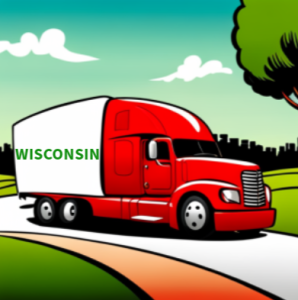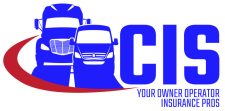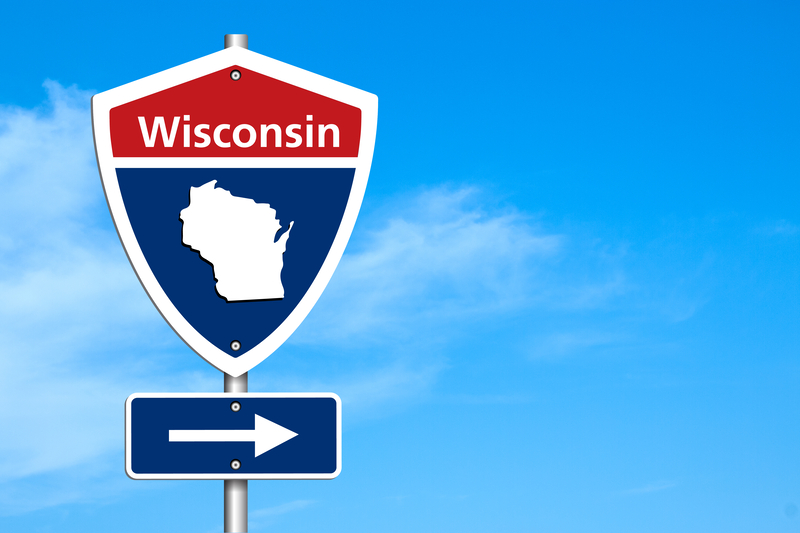Great News for New Truckers—GEICO’s here to help you tackle Wisconsin’s Insurance Requirements!
If you’re a newbie you gotta first know the basics of Wisconsin Insurance Requirements:
FMCSA (Federal Motor Carrier Safety Administration)– oversees the Department of Transportation nationwide.
WisDOT (Wisconsin Department of Transportation)–follows FMCSA guidelines for trucking operations.
Interstate or Intrastate, Wisconsin truckers are required to register for a Federal DOT number.
Once you establish your DOT number you will need to provide proof of insurance to FMCSA and WisDOT.
Let’s take it one step at a time:
How proof of insurance for a new DOT operating authority works:
- First you register with FMCSA for your DOT number.
- Then buy your insurance and it’s electronically sent to FMCSA for you–referencing your new DOT number.
- This proof of insurance is called your BMC-91X Filing.
- The MCS-90 is just your insurance company promising FMCSA you have coverage in place.*
- Your insurance company also sends your Form E certificate of insurance to WisDOT.
- During this time, you will get calls about filing your BOC-3 Form–this is easy so no worries.
- Within a month, FMCSA issues your actual MC number which is your approved Motor Carrier interstate operating authority.
The MCS-90 is kind of like a bond—it’s your insurance company’s promise to protect the public.
That’s why you can’t just cancel trucking insurance right away. The FMCSA requires a 35-day notice period so everyone knows when the coverage ends.
But don’t jump into your new DOT Operating Authority just yet!
First, take the time to get your ducks in a row.
Make sure the insurance costs and all other overhead costs fit your budget.
Your first step is to make contact with a great Transportation Insurance Specialist– she’ll hold your hand through this process:)
She’ll show you the ropes by guiding you step by step into your new venture.
You’ll get a pretty good idea of what everything will cost BEFORE you spend the money on your DOT number.
There are pros and cons to becoming a new motor carrier that she can talk through with you.
Sometimes it’s even better to hold off on a new DOT and haul for someone else for a year to see if you even like trucking!
We work as your advocate and want to help you succeed.
When it’s time for you to pull the trigger, we’ll help you with our Simple Steps to Get Your Motor Carrier Authority Cheat Sheet.
Why is Trucking Insurance in Wisconsin so Expensive?
Compared to other states, Wisconsin is a very attractive location to set up a new Motor Carrier authority.
The main reason ALL commercial trucking insurance is expensive is that losses continue to be higher than income.
This is due to accidents and lawsuits.
But there’s finally some good news on the horizon for Cheeseheads!
The Gecko Takes on the Badger State!
Yep, GEICO is finally here for Wisconsin Truckers!
They’ve come in with some awesome rates for both new Owner Operators and experienced motor carriers.
We’re very excited to partner with them to help out our guys with lower premiums!
You check out more at Wisconsin GEICO Commercial Truck Insurance
What Insurance Coverage Do Truckers Need in Wisconsin?
Wisconsin follows FMCSA guidelines for Interstate Trucking for Hire Insurance:
Cargo Van & Sprinter Insurance – minimum of $300,000 CSL Commercial Auto Liability
Hot Shot Trucking Insurance and larger units – minimum of $750,000 CSL Commercial Auto Liability
CSL = Combined Single Limit
Starting with the minimum insurance is totally fine to get your authority, but keep in mind that many brokers and customers will want to see proof of $1,000,000 CSL coverage.
That number is important—it gives you way more flexibility with brokers and unlocks better freight opportunities later on.
When you’re crunching the numbers, make sure to check out both the lower liability option and the one million liability option.
Here’s the quick lowdown on Commercial Auto Liability:
It basically covers two big things: Bodily Injury and Property Damage.
Bodily Injury Liability kicks in if you’re at fault in an accident where someone gets hurt—or worse. It can help cover stuff like medical bills, rehab, long-term care, funeral costs, lost wages, and even pain and suffering.
Property Damage Liability helps if you damage someone else’s property—like their car, a building, or even their pet! It can cover repairs or replacements.
For commercial trucking, these are usually bundled together under something called “CSL” (Combined Single Limits).
What about General Liability?
General Liability and Commercial Auto Liability are two different things.
Commercial Auto Liability covers you while driving your truck and is required by WISDOT & FMCSA to stay legal.
General Liability? That’s for everything off the road—like loading accidents or delivery issues.
It’s affordable and worth considering—your Brokers and Customers certainly will!
Want to learn more? Check this out: Commercial Truck General Liability Explained.
Many brokers and customers now ask for this extra coverage, so it’s important to know what it is.
While not required by FMCSA for your DOT authority, it’s becoming common enough to get an idea of the cost.
Luckily, General Liability Insurance costs a fraction of Commercial Auto Liability Insurance.
Will you need Motor Truck Cargo Insurance?
If you’re hauling freight for hire, Yes.
Your brokers and customers will expect you to have Motor Truck Cargo Insurance.
Basically, it protects the freight you’re hauling—but there’s a bit more to it than that.
Take the time to learn more at What Does Motor Truck Cargo Cover?.
Most carriers choose $100,000 coverage limit, but your Trucker Pro Agent will chat with you about what you’re hauling and the exact kind of Commercial Cargo Coverage you may need.
What about Physical Damage Insurance?
Physical Damage Coverage is what insures the truck itself.
Collision Coverage: Whether you bump into another vehicle, hit something, or your truck rolls over, this helps cover repairs or even replaces your truck.
Comprehensive Coverage: This covers all the non-collision stuff—like if your truck gets stolen, a tree falls on it, or weather damages it (hail, wind, you name it). Even hitting an animal is covered. If it’s not a collision, this usually has you covered.
Your Physical Damage coverage is based on either your truck’s Actual Cash Value (ACV) or the Stated Amount.
Remember to factor in anything permanently attached when valuing your truck.
This should get you thinking about Permanently Attached Equipment on your own truck:
- Custom paint, decals, or signs
- Bolted or mounted electronics
- 5th wheel receivers and other coupling devices
- Vacuum equipment and accessories
- Mounted toolboxes, shelving, or ladder racks
- Tarps, chains, binders—you get the idea
Make sure you’ve got the right protection for your truck and everything on it!
Wisconsin Trucking Insurance extras:
Uninsured or Underinsured (UM/UIM)
Ever worry about getting hit by someone with little or no insurance? That’s where UM/UIM coverage comes in handy. It helps cover stuff like medical bills, lost wages, and even pain and suffering if you or your passengers get hurt in an accident. It kicks in if the other driver’s at fault and doesn’t have enough insurance to cover the damage.
Medical Payments (MedPay)
MedPay’s got your back for medical bills—or even funeral costs—if you or your passengers get hurt in a truck accident.
Both UM/UIM and MedPay are budget-friendly add-ons and totally worth including in your insurance plan!
Thinking about Becoming a Motor Carrier but not sure where to begin?
You’re in the right spot!
Check out our CIS Trucking Insurance Blog—it’s full of answers to questions you didn’t even know you had:)
Ready to talk? Give us a call at CIS: (330) 864-1511.
Let’s get everything set up the right way so you can hit the road with your ducks in a row!
We are CIS, and We Make Your Truck Insurance Easy!

Authors
Shelly Benisch, CIC, TRS started Commercial Insurance Solutions, Inc. (CIS) in 2002 and brings over 30 years of experience in Commercial Truck Insurance. As one of the top 25 Progressive Truck Insurance Agency Leaders in 2024, she helps Motor Carriers and Owner Operators across the country find affordable trucking insurance quotes with GEICO, Progressive and more. Shelly also writes a free Trucking Blog packed with all kinds of tips. Her team of Truck Insurance Experts have earned CIS consistent 5-star reviews and Progressive's Top 25 Truck Elite Status. For expert Commercial Truck Insurance advice, give Shelly a call at (330) 864-1511
CEO
#CISDoesThat Commercial Truck Insurance for owner operators and motor carriers.Christina Cummings, TRS certified, leads Commercial Insurance Solutions, Inc. (CIS) as Executive Director and true experienced advice on Commercial Truck Insurance. She secures the most affordable GEICO quotes and Progressive quotes...and more for small Motor Carriers and Owner Operators nationwide. She is your "go to" person at CIS for advice with underwriting questions, tips and networking opportunities for Small Truckers. Under her leadership CIS earned Progressive's Top 25 Truck Elite status in 2024 and consistent 5-Star Google reviews. She also co-authors the free CIS Commercial Truck Insurance Blog for small Motor Carriers and Owner Operators, sharing her bottom line tips on how to find more affordable Commercial Truck Insurance. Looking for expert trucking insurance advice–Christina is your go to leader at (330) 864-1511 #CISDoesThat

